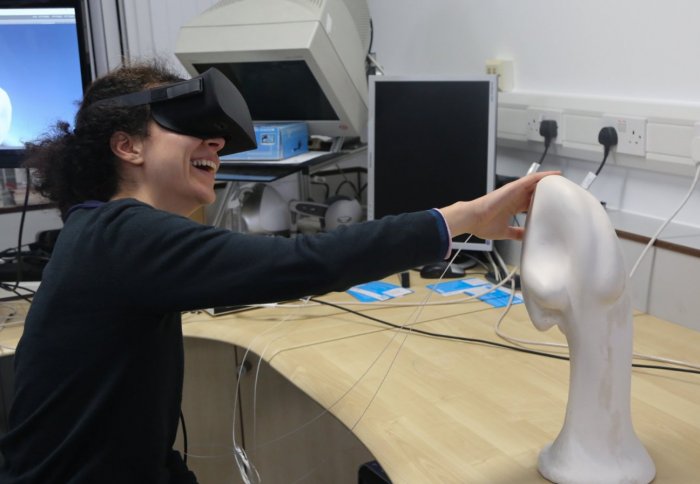Findings on Palpation Workshop
by Duncan Boak

One of the workshop participants palpates the sculpture. Photo courtesy of Lou Macnamara
Sculptor Johann Arens and Dr. Alejandro Granados co-host a workshop investigating tactility in art and the potential of haptic interfaces.
Palpation, the process of using one’s hands to examine the body, is common practice within medicine, yet in the world of art it is often expected that you look, but don’t touch.
Sculptor Johann Arens collaborated with Dr Alejandro Granados from the Centre for Engagement and Simulation Science to hold a workshop at Chelsea & Westminster Hospital on 28th February which explored the use and limitations of the sense of touch in both art and medical training. Johann created a replica of the first known piece of sculpture that was intended to be touched, which was featured at the workshop alongside the Centre’s haptic Digital Rectal Examination (DRE) trainer. The workshop was part of Johann's art residency at Hackney-based SPACE Studios.
Johann gave a presentation on how the tactility is underused in the art world and his interest in haptic technologies that enable medical students to develop their palpation skills without the need for a real patient. Dr Granados, who has developed the DRE trainer, then spoke about the importance of the sense of touch in medicine and whether clinicians are becoming more dependent on vision, given the ever-increasing quality of imaging technology.
The fifteen workshop participants had the opportunity to perform a simulated rectal examination using the haptic device. Then, whilst wearing virtual reality headsets and sensors on their fingers, they explored Johann's sculpture with their hands. Whilst the surface certainly felt hard, the images they were seeing through the headset showed the sculpture deforming in response to their manipulation – a clash of perceptions that many of the participants found very strange.
Following the activities, a group discussion explored the limitations of the sense of touch in both art and medicine, to end what participants found to be an engaging and interesting experience.
Article text (excluding photos or graphics) © Imperial College London.
Photos and graphics subject to third party copyright used with permission or © Imperial College London.
Reporter
Duncan Boak
Department of Surgery & Cancer